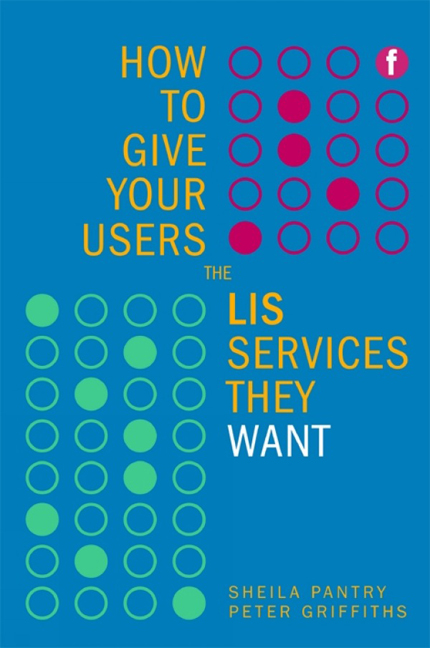Book contents
- Frontmatter
- Contents
- Preface
- 1 Why this book?
- 2 Understanding users – the what, why, where, when, how and who
- 3 What is the current knowledge about your users and their needs – is it really predictable?
- 4 Great expectations: how LIS professionals can manage and train users
- 5 Using information about past user behaviour
- 6 Making the most of knowing your users
- 7 Keeping track of changes in what users want
- 8 Tracking the future
- 9 Future perfect?
- Appendix 1 Reading list and references
- Appendix 2 Where to go for further information
- Index
4 - Great expectations: how LIS professionals can manage and train users
Published online by Cambridge University Press: 08 June 2018
- Frontmatter
- Contents
- Preface
- 1 Why this book?
- 2 Understanding users – the what, why, where, when, how and who
- 3 What is the current knowledge about your users and their needs – is it really predictable?
- 4 Great expectations: how LIS professionals can manage and train users
- 5 Using information about past user behaviour
- 6 Making the most of knowing your users
- 7 Keeping track of changes in what users want
- 8 Tracking the future
- 9 Future perfect?
- Appendix 1 Reading list and references
- Appendix 2 Where to go for further information
- Index
Summary
In this chapter we discuss:
➡ how to manage users of the service
➡ levels of expectations
➡ the role of the information professional
➡ user training.
In the previous chapter we took a general look at how the nature of library use has been changing, and in particular the impact of the generation known by labels such as ‘Digital Natives’, ‘Gen-Y’ and the ‘Google Generation’. Now we examine issues in more depth, looking at the changes in the way this generation uses the services we offer, and the new issues this raises for LIS managers.
Managing users of the service Access
Libraries have long been used to receiving enquiries by telephone and letter, and to dealing with customers beyond the physical building. The professional judgement of reference staff has ensured that the customer has received the most appropriate material to meet the enquiry based on the customer's request and the amount of detail available to refine the enquiry. This remote form of reference interview has served to identify the most suitable materials where the remote customer has been unable to access or assess it.
The widespread development of e-library services has radically changed this model. Using e-services, customers can now view materials online, and select the most useful publications for their purpose. But they can also bypass professional intervention altogether, and run the risk of failing to find all the available materials, perhaps because of failures of their search strategies, or perhaps because their lack of subject knowledge did not alert them to the absence of particular documents. They may well be unaware of relevant resources that are missing from their electronic repository (including of course those that remain only in print-on-paper format).
Identifying authorized users
In the physical library, authorized customers are identified by a physical token such as a ticket or patron card. This is recognized by the staff and an agreed set of privileges is offered to the patron in accordance with his or her membership. This token also acts as an acceptance by the patron of the rules under which the collection is managed, for example by agreeing to a maximum number of items to be borrowed at a time.
- Type
- Chapter
- Information
- How to Give Your Users the LIS Services They Want , pp. 45 - 60Publisher: FacetPrint publication year: 2009



